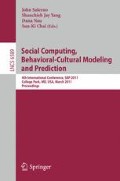Abstract
This study examines the innovation output of software development that produces public goods. We use resource dependence theory and collective action theory to explain the effects of interconnectedness on open source software (OSS) communities, and on contributions to public goods. We empirically test our proposals using an eight-year panel dataset on OSS projects based on the Eclipse Foundation, and conclude that interconnectedness negatively affects community mobilization and its contributions to public goods.
Access this chapter
Tax calculation will be finalised at checkout
Purchases are for personal use only
Preview
Unable to display preview. Download preview PDF.
References
von Hippel, E., von Krogh, G.: Open source software and the ”private-collective” innovation model: Issues for organization science. Organization Science 14(2), 209–223 (2003)
Hardin, G.: The Tragedy of the Commons. Science 162(3859), 1243–1248 (1968)
Olson, M.: The Logic of Collective Action: Public Goods and the Theory of Groups. Harvard University Press, Cambridge (1965)
Osterloh, M., Rota, S.: Open source software development–Just another case of collective invention? Research Policy 36(2), 157–171 (2007)
Oliver, P.E., Marwell, G., Teixeira, R.: A theory of the critical mass. I. Interdependence, group heterogeneity, and the production of collective action. American Journal of Sociology 91(3), 522–556 (1985)
Marwell, G., Oliver, P.E., Prahl, R.: Social networks and collective action: A theory of the critical mass. III. American Journal of Sociology 94(3), 502–534 (1988)
Monge, P.R., et al.: Production of Collective Action in Alliance-Based Interorganizational Communication and Information Systems. Organization Science 9(3), 411–433 (1998)
Pfeffer, J., Salancik, G.R.: The external control of organizations: a resource dependence perspective, vol. xiii, p. 300. Harper & Row, New York (1978)
Shah, S.: Motivation, governance, and the viability of hybrid forms in open source software development. Management Science 52(7), 1000–1014 (2006)
Fulk, J., et al.: Connective and communal public goods in interactive communication systems. Communication Theory 6(1), 60–87 (1996)
Aldrich, H.: Resource Dependence and in Terorganiza Tional Relations: Local Employment Service Offices and Social Services Sector Organizations. Administration Society 7(4), 419–454 (1976)
Simon, H.A.: The sciences of the artificial. MIT Press, Cambridge (1996), 9780262691918
Lerner, J., Tirole, J.: Some simple economics of open source. The Journal of Industrial Economics 50(2), 197–234 (2002)
Haefliger, S., von Krogh, G.F., Spaeth, S.: Code Reuse in Open Source Software Development. Management Science 54(1), 180–193 (2008)
Baldwin, C.Y., Clark, K.B.: The Power of Modularity. In: Design Rules, vol. 1. The MIT Press, Cambridge (2000)
MacCormack, A., Rusnak, J., Baldwin, C.Y.: Exploring the structure of complex software designs: An empirical study of open source and proprietary code. Management Science 52(7), 1015–1030 (2006)
West, J., O’Mahony, S.: The Role of Participation Architecture in Growing Sponsored Open Source Communities, pp. 145–168. Carfax Pub. Co., Abingdon (2008)
Bechky, B.A.: Sharing meaning across occupational communities: The transformation of understanding on a production floor. Organization Science 14(3), 312–330 (2003)
Hars, A., Ou, S.: Working for free? Motivations for participating in open-source projects. International Journal of Electronic Commerce 6(3), 25–39 (2002)
Hertel, G., Niedner, S., Herrmann, S.: Motivation of software developers in Open Source projects: an Internet-based survey of contributors to the Linux kernel. Research Policy 32(7), 1159–1177 (2003)
von Krogh, G.F., Spaeth, S., Lakhani, K.: Community, joining, and specialization in open source software innovation: a case study. Research Policy 32(7), 1217–1241 (2003)
Bartels, B.: Beyond fixed versus random effects: a framework for improving substantive and statistical analysis of panel, time-series cross-sectional, and multilevel data. The Society for Political Methodology (2008)
Roebuck, M.C., Liberman, J.N.: Impact of Pharmacy Benefit Design on Prescription Drug Utilization: A Fixed Effects Analysis of Plan Sponsor Data. Health Services Research 44(3), 988–1009 (2009)
Wooldridge, J.M.: Econometric analysis of cross section and panel data. The MIT press, Cambridge (2002)
Pesaran, M.H.: General diagnostic tests for cross section dependence in panels (2004)
Hoechle, D.: Robust standard errors for panel regressions with cross-sectional dependence. Stata Journal 7(3), 281 (2007)
Ostrom, E.: Governing the commons: The evolution of institutions for collective action. Cambridge Univ. Pr., Cambridge (1990)
Author information
Authors and Affiliations
Editor information
Editors and Affiliations
Rights and permissions
Copyright information
© 2011 Springer-Verlag Berlin Heidelberg
About this paper
Cite this paper
Garriga, H., Spaeth, S., von Krogh, G. (2011). Open Source Software Development: Communities’ Impact on Public Good. In: Salerno, J., Yang, S.J., Nau, D., Chai, SK. (eds) Social Computing, Behavioral-Cultural Modeling and Prediction. SBP 2011. Lecture Notes in Computer Science, vol 6589. Springer, Berlin, Heidelberg. https://doi.org/10.1007/978-3-642-19656-0_11
Download citation
DOI: https://doi.org/10.1007/978-3-642-19656-0_11
Publisher Name: Springer, Berlin, Heidelberg
Print ISBN: 978-3-642-19655-3
Online ISBN: 978-3-642-19656-0
eBook Packages: Computer ScienceComputer Science (R0)

